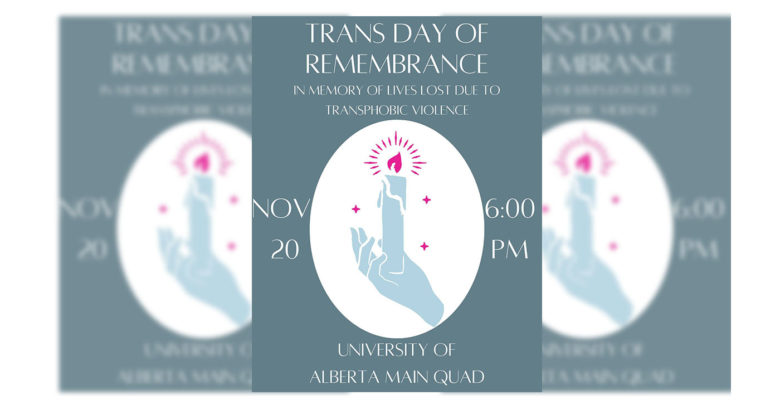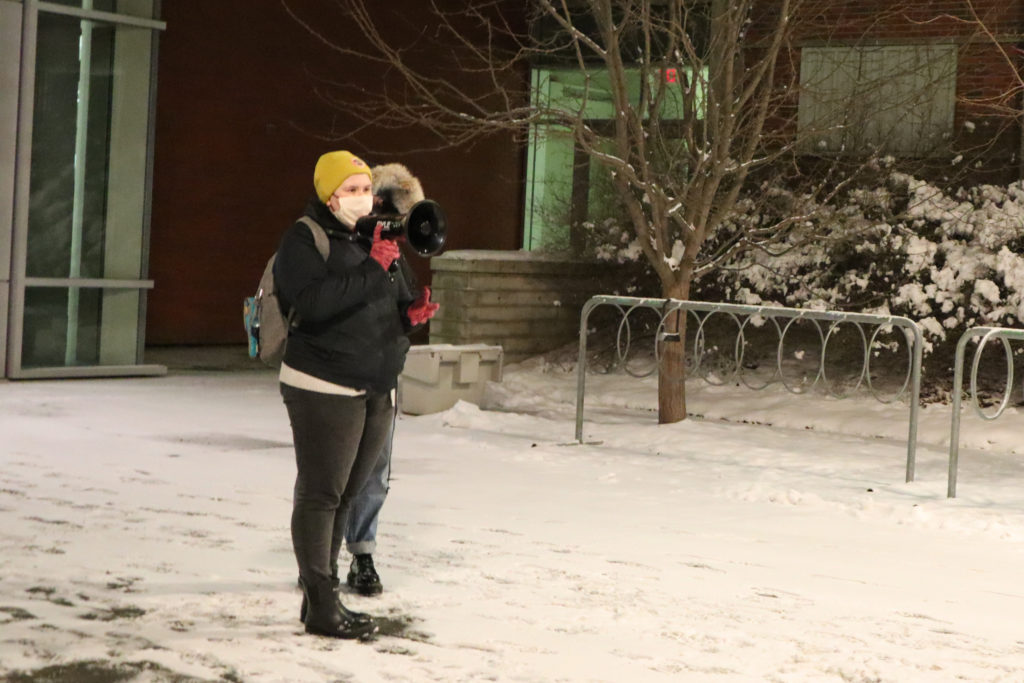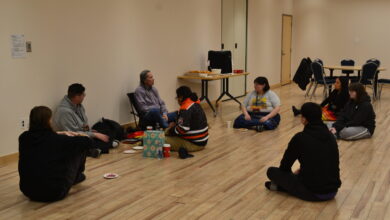Trans Day of Remembrance honoured at student-organized vigil
With approximately 30 community members in attendance, the vigil brought awareness to lives lost to transphobia in 2021.
 Supplied: Trans Day of Remembrance Vigil
Supplied: Trans Day of Remembrance VigilTo acknowledge Trans Day of Remembrance, students at the University of Alberta organized a vigil on Main Quad.
The vigil, held on November 20, was primarily organized by Rowan Morris, an undergraduate student and education councillor on Students’ Council. With approximately 30 community members in attendance, the vigil brought awareness to lives lost to transphobia in 2021.
Morris began their speech by acknowledging 2021 as the deadliest year on record for trans people. With over 400 documented deaths, Morris described these deaths of trans individuals as “attributed to murder, suicide, and negligence.”
“How many of them were buried with their dead name?” Morris questioned. “How many of them died in the closet?We will never truly know how many of them are dead as a byproduct of hatred.”
Morris described the vigil as an opportunity to mourn trans individuals who have lost their lives — voicing a special acknowledgement for transgender women of colour.
“Today we mourn the thousands of transgender people who died too young,” they said. “Transgender women of colour die at a predominantly higher rates. Transgender women of colour are the backbone of our revolution. Transgender women of colour are our neighbours, they’re our friends, they’re our loved ones, and they’re dying.”
Morris brought attention to the death of Rita Hester, a Black transgender woman who was murdered in her apartment in 1998. The brutal murder of Hester sparked the international Transgender Day of Remembrance.
“[Hester] was caring,” Morris detailed. “She was responsible. She was trans — and she was killed for it. Her mother says that the only reason that she [thought] that someone [would] kill her beautiful daughter was because she was transgender and Black… and she died in her own home because she was simply herself.”
After telling Hester’s story, Morris listed the names of 462 trans, non-binary, and gender diverse individuals who lost their lives to violence and transphobia. This list of names was compiled by Calgary Pride.
Student calls out U of A for being “apathetic” against transphobic violence.
After taking a moment of silence for the trans lives lost in 2021 due to violence and hatred, Morris called out U of A administration for “not sharing the same beliefs as the vigil.” Morris pointed to specific structural barriers trans individuals encounter at the university, starting with issues around trans students changing their name on school records.

Currently the university requires students’ U of A records to contain their full legal name. Students looking to change their legal name must provide the university with supporting government-issued documentation, such as a birth certificate or passport.
On Bear Tracks students have the option of providing a preferred first or middle name, which can be immediately updated on the website after a student manually changes it. After this change, the university is permitted to use either students’ preferred first name or legal first name in their communications with students “as determined by the university in its sole discretion.”
In their speech, Morris detailed specific problems that they encountered concerning name changes.
“I need to provide a legal name change in order to have my name displayed anywhere,” they said. “Every single time I hand in an assignment, make a forum post, or send an email, people are reminded that my name is not my name.”
In response, a U of A spokesperson said that students are able to change their preferred name on Bear Tracks, which should subsequently change their name on the university’s e-learning platform.
“University of Alberta students are able to update their records to reflect their correct, gender-affirming preferred name,” the spokesperson said. “[The university’s] e-learning platform pulls names directly from Bear Tracks. Students can independently edit their preferred name in Bear Tracks; any change the student makes to their preferred name in Bear Tracks will be pulled into [the U of A’s] e-learning platform.”
Morris voiced further structural challenges faced by trans U of A students, including barriers in academic and professional development. Morris additionally noted that access to all-gender washrooms remains an issue on campus.
“I have had to take all of my courses online this semester, because a chronic illness does not mix well with needing to walk 20 minutes to the nearest washroom,” Morris said. “I have had to switch out a course because I had a professor tell me I could not succeed as a teacher and a trans person… my professors do not have adequate professional development to correctly name and gender me.”
Currently, not all buildings at the university’s campuses have all-gender washrooms, including the Centennial Centre for Interdisciplinary Science (CCIS), Rutherford Library, and the Central Academic Building (CAB).
Comment provided by a U of A spokesperson gave examples of action the U of A is taking to ensure inclusivity for trans students on campus.
“In addition to the gender-neutral washrooms already located on campus, dedicated efforts continue to include these important spaces as buildings are designed or updated,” the spokesperson said. “For example, renovations to University Commons (formerly Dentistry/Pharmacy Centre) will include gender-neutral washrooms, right at the centre of campus.”
Morris described the university administration as apathetic towards hardships faced by trans student. They noted Bill Flanagan, president of the U of A, and faculty representatives in General Faculties Council were invited to the vigil but were not in attendance.
“[The university] know[s] about these issues, and they’re complacent,” Morris said. “They offer no solutions. They offer no empathy, and we suffer.”
According to a U of A spokesperson, Flanagan was unable to attend the service due to an out-of-town commitment.
Morris also voiced frustration with the university for supporting staff who — in Morris’s view — maintain transphobic viewpoints.
They specifically mentioned Kathleen Lowrey, an associate professor of anthropology at the U of A and former associate chair of undergraduate programs for the department, as an example.
“I am fucking exhausted to know that [the university] coddles staff like Kathleen Lowrey who openly hates trans folks,” they said. “To know that they do nothing to protect our students boils my blood. I am fucking exhausted.”
In June 2020, Lowrey was dismissed by the university as associate chair, but remains a professor at the U of A. The university did not state the reason for the professor’s dismissal as associate chair, but Lowrey speculated it was due to her views on transgender identity and biological sex.
In a response provided by Lowrey, she expressed hope that the university community will recognize “the irony” of punishing those “who affirm that gender identity ideology is misogynist.”
“I continue to hope that students, my colleagues, the administration, and the public will come to recognize the irony of calls to ratchet up punishments for women who steadfastly affirm that gender identity ideology is misogynist in its motivations and in its impacts,” Lowrey said in her provided statement.
Comment from the U of A stated individual perspectives of faculty members do not reflect the institution.
“Faculty members are entitled to academic freedom and free expression,” the comment said. “The individual perspectives of any one faculty member do not reflect or represent those of the institution.”
Morris expressed dissatisfaction for the current environment the U of A has fostered for trans students.
“I am sick of knowing that the university is contributing to a world where trans people constantly look over their shoulder,” Morris said. “I am sick of knowing that the university consistently ignored solutions we offer. I am sick of the environment they allow. I am sick of the environment that poisons our sense of self and contributes to the names I read tonight.”
“I hope this makes it explicitly clear — this vigil does not align [with] or represent the beliefs of the U of A.”




